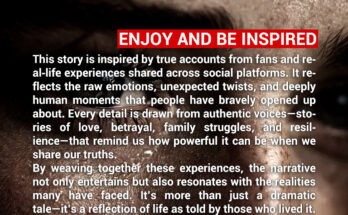I applied for a job that looked perfect—fair pay, a strong team, and real growth. The first interview felt easy: steady rhythm, honest questions, and mutual enthusiasm that made me believe they saw me clearly. Then the “tests” arrived, not one or two, but four separate projects framed as evaluation. They asked for real work: strategy decks, competitor analyses, and a full campaign proposal—deliverables they could deploy without paying a cent. After every submission, they repeated the same line: “You’re our strongest candidate so far.” I kept going—skipping weekends, losing sleep, pouring everything into those tasks with stubborn hope.
Five rounds later, exhausted but hopeful, HR called and said, “It’s between you and another candidate. We’ll let you know next week.” A week passed. Then two. Silence settled in like dust—no rejection, no offer, just an email saying, “We’ve decided to postpone hiring for this position.” I accepted it and moved on, refusing to linger in uncertainty. Three months later, while scrolling LinkedIn, a post stopped me cold: “Excited to announce our new campaign launch!” The visuals, copy, and structure were mine, not inspired by my work, but replicated slide for slide.
Shock turned to anger, then to resolve. They had taken my unpaid interview project and launched it as their flagship campaign. I left a single comment beneath their post: “Looks familiar 😉.” No explosion, no essay—just precision. By the next day, the post vanished as if memory could be deleted. But I had already taken screenshots and documented everything—timestamps, emails, files, and their relentless praise. I turned the receipts into a story titled, “That time, a company used my unpaid interview project as their campaign,” and I hit publish. It traveled faster than I expected.
By morning, my post had gathered thousands of likes and DMs, a chorus of outrage and solidarity. People shared their own stories, offered advice, and reminded me that boundaries protect creativity. Among the responses, one comment stood out and felt like a door swinging open: “We’d love to hire someone with that kind of creativity — and integrity.” The message was direct, respectful, and grounded in the values I had defended publicly. Two weeks later, I signed a new contract—higher pay, a streamlined interview, and one reasonable test that honored the work and the person doing it.
In the end, I didn’t chase the company that took from me; I chose the one that valued what I brought. The stolen campaign quietly disappeared, but my post remained visible, right beside the announcement of my new role. Justice didn’t arrive as punishment; it arrived as alignment. I learned how exploitation can hide in compliments, how “you’re our strongest candidate” can be a cover for free labor, and how documentation—screenshots, timestamps, clear emails—turns mistreatment into accountability. Silence after trust isn’t a misunderstanding; it’s a decision. Choosing myself wasn’t spite. It was repair.
That experience changed how I approach opportunities, tests, and boundaries. I don’t perform unpaid campaigns masquerading as evaluations anymore. I ask for clarity, scope, and fairness upfront. I trust early enthusiasm but verify respect. Most of all, I keep my receipts and my voice, because stories can become shields and bridges. The company that took my work doesn’t define my worth; the community that amplified it helped me reclaim it. Sometimes the best revenge isn’t flame or exposure—it’s a better door opening, and the courage to walk through it without looking back at the one that stayed shut.


